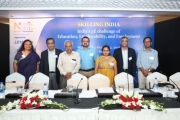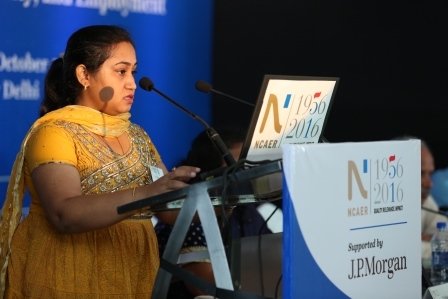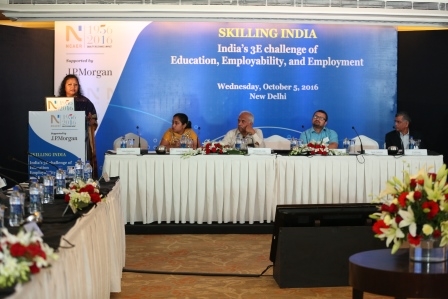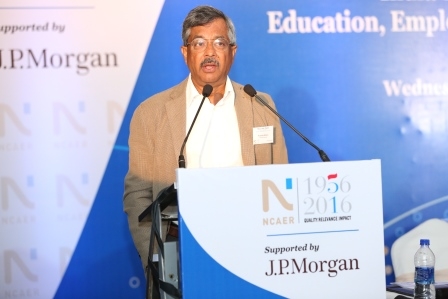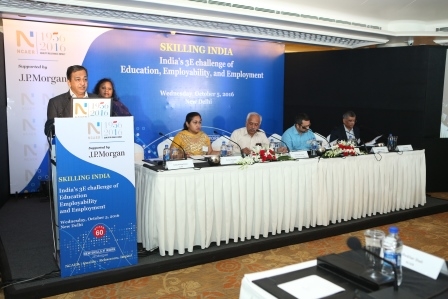As per the Census 2011 data, India has 730 million people in the age group of 15-59 years, which gives India an opportunity to reap a significant demographic dividend. The government’s skills development policy (2015) notes that India is “presently facing a dual challenge of a severe paucity of highly-trained, quality labour, as well as non-employability of large sections of the educated workforce that possess little or no job skills”. The situation gets further complicated given the fact that about 93 per cent of the workforce is in the informal sector, and it is difficult to track their skills and impart the requisite training to them. The estimated rate of job creation in the informal sector is higher than that in the formal sector, thus creating relatively low productive jobs. India thus needs to equip its workforce with employable skills and knowledge.
NCAER has undertaken the J.P. Morgan New Skills at Work-India (NSAWI) program under NCAER Labour Economics and Research Observatory (N-LERO). It seeks to focus on the three critical elements of education, employability, and employment. The study aims at contributing both to policy as well as practice pertaining to employability, labour markets and the skilling supply chain. The objective of Phase 1 (out of three phases) of the study was to develop a sharper understanding of the challenges pertaining to jobs and skills – what is working and what is not, and what are the policy recommendations.
This second consultation workshop on this study was held at The Claridges in New Delhi. The workshop was inaugurated by Dr Rajesh Chadha of NCAER, who welcomed the participants and introduced the programme.
Dr Biswajit Goldar, Institute of Economic Growth, chaired the first session on “Skill in India: The 3-E Approach”. Dr Bornali Bhandari, NCAER, introduced the concept of skills, and pointed out that a broader framework of skills, including cognitive, physical, interactive and vocational skills, are needed in the country. She also discussed the inherent challenges in measuring skills. NCAER has developed an index based on the 3-E concept to assess the skill levels of 21 major states in the country. Ms Tullika Bhattacharya, NCAER, delineated the level of skills employed by 24 key sectors identified by the National Skills Development Corporation (NSDC). The novelty of the index lies not only in the categorisation of skills but also in the fact that it takes into account all three types of education, that is, general, vocational and technical education. Dr Abhiroop Mukhopadhyay of the Indian Statistical Institute, Delhi, argued that education does not translate into actual usable skills though it may be equated to capability. He further remarked that there is a need for a focused discussion on women, especially since most women in India are not participating in the labour force even though their educational aspirations are similar to those of men. Dr Mukhopadhyay also pointed out that while at the macro level, there is a shortage of skills, at the micro level, people do not really want to out-migrate from their local cities and towns. Dr Rajesh Chakrabarti of the Wadhwani Foundation gave critical comments on indices and their relevance. Mr Anil Kumar of the Axis Bank Foundation discussed the challenges of skilling in the rural sector.
The keynote address at the Conference was chaired by Dr Rajesh Chadha and delivered by Mr Pramod Bhasin, Founder and Vice Chairman, Genpact and Chairman, The Skills Academy. He highlighted that employment is a vastly under-served and under-researched area in India. The Skills Academy has trained multitudes in domain skills, lifestyle skills and employability skills. The National Skills Development Corporation (NSDC) has made a very robust contribution to the skilling effort. India would account for 35 per cent of the entire world’s workforce in the next 10 years, and educating this workforce and imbuing them with the requisite skills for employment would be the biggest challenge that India would face in the future. India largely exists in the small and medium sectors. The workforce, therefore, needs to be trained for employment in these sectors. Since 60-70 per cent of the people want to work in the government because of the perpetual job uncertainty in the private sector, the logistics of training needs to take this into account. Industries do not provide quality jobs or offer enough job support for the workforce in the country. It is imperative to skill women and to empower them by imparting appropriate training in technology and other areas of employment. There is a need for skills mapping and addressing the skill gaps.
The third session of the Conference on “Education and Employability: Convergence or Divergence?” was chaired by Professor Jandhyala B.G. Tilak, of the National University of Education Planning and Administration. He remarked that the topic of the discussion reminded him of erstwhile debates on whether to converge mainstream with vocational education. While Ms Mousumi Das, NCAER, and Dr Bornali Bhandari discussed the current challenges in the education and vocational skills sectors, the various discussants emphasised the need for convergence between the two types of education. Dr Ankush Aggarwal of the Indian Institute of Technology, Delhi, averred that engineers are hired in companies, where they do not use the core skills that they are trained in. Mr Raj Gilda of Lend-A-Hand India and Mr Abhishek Gupta, Adviser to the Delhi Government, talked about their respective experiences in bringing vocational education to school education in Maharashtra and Delhi respectively. Mr Gupta outlined the logistics and infrastructure issues in Delhi, such as the challenges of transporting students from school to the laboratory. The key question posed by the discussants was: Are children at a young age, such as a 14-year old in Class 9, mature enough to decide their career options? Mr Jagmohan Bhogal of the Quality Council of India remarked that the goals of the two types of education, that is, mainstream and vocational education, are different, and the two ought to be brought together through careful convergence.
Mr Dilip Chenoy of the Sant Longowal Institute of Engineering and Technology, and erstwhile CEO of NSDC, chaired the fourth session of the Conference on “Employability and Employment: Scaling Up”. Dr Pallavi Choudhuri of NCAER discussed the importance of recognition of prior learning (RPL) and the challenges faced by Micro, Small and Medium Enterprises (MSMEs), especially the shortage of skilled labour. Dr Saurabh Bandyopadhyay of NCAER talked about the challenges posed by labour laws. The four panellists of this session included Neeta Das of the Confederation of Indian Industry (CII), Mukesh Gulati of the Foundation of MSME Clusters, Jürgen Männicke of iMOVE, and Rahil Rangwala of the Michael and Susan Dell Foundation. Both Mr Gulati and Mr Rangwala asserted that skilled labour is not one of the key shortages of the MSME sector, and pointed to its inter-linkages with other challenges in that sector, including access & use of technology, access to formal bank credit and access to markets. Another key element is the need for counselling of the MSME owners. The panellists commented on the ambiguity that though industry complained about shortages of skilled workers, it was still not willing to hire certified people for a higher wage versus uncertified people. Further, the Sector Skill Councils are not able to predict the exact number of jobs that would be available in each sector. Jürgen Männicke pointed out similarities between the German model and the Indian model. However, unlike in India, German MSMEs are hiring a majority of the apprentices. In addition, German companies are mandated by law to share data and to become members of Industrial Chambers
The last session of the Conference, a policy roundtable on the impact of technology on job creation, was chaired by Dr Rajesh Chadha of NCAER. Mr Chauncy Lennon of J.P. Morgan, Mr Achyuta Ghosh of NASSCOM, Mr Ambarish Datta, MD and CEO, BSE Institute Limited, and Mr Santosh Kumar Mehrotra, Professor, Jawaharlal Nehru University, were the panel discussants in this session. The panellists agreed on the need for adopting a sectoral approach to deal with the challenges. It was pointed out that though a majority of the people are not even part of the formal sector, this is not the main problem envisaged. Instead, the focus should be on upskilling workers in the other sectors even as some other types of jobs are expected to dry up.
In an exclusive interview to NDTV, Dr Shekhar Shah outlined the objectives of this study and the key inferences from the first phase of research. He also discussed the challenges of Skilling India in context of its vast demographic dividend and drew up alternative scenarios for the jobs future of the country.






